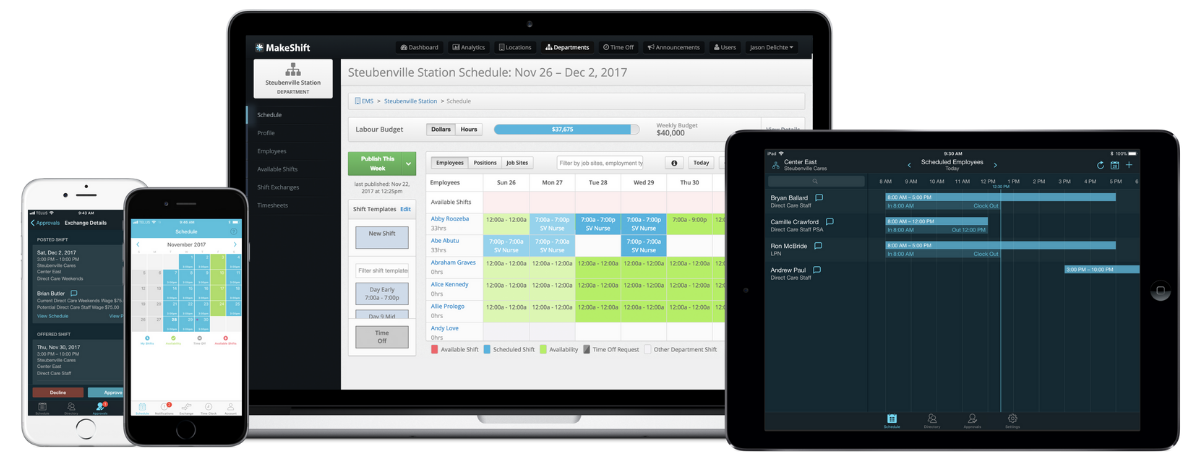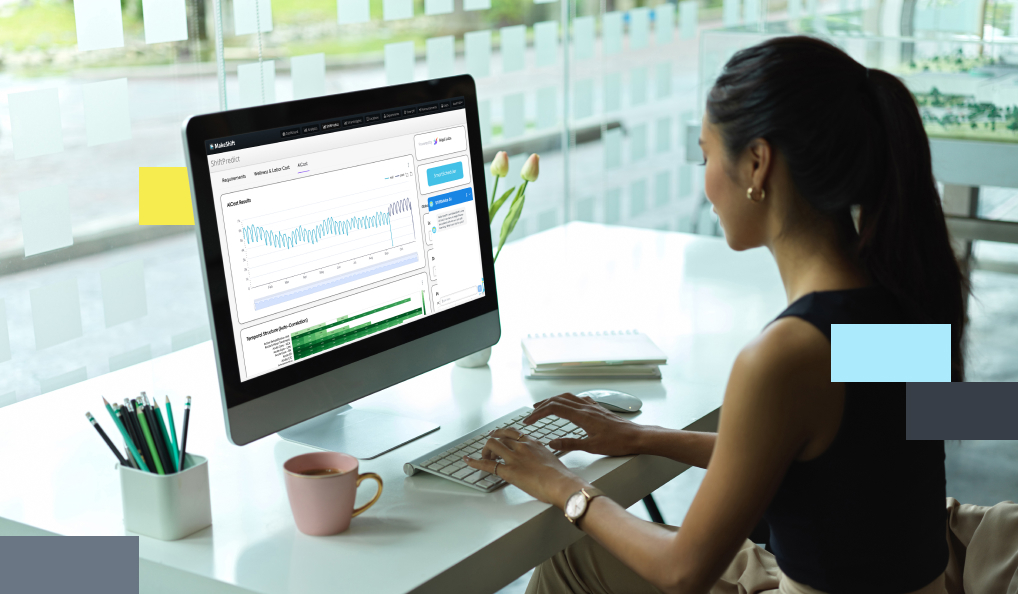Artificial Intelligence is at the forefront of today’s HR departments, redefining the status quo of managing our invaluable human capital.
Regardless of how agile your organization is to change, AI brings cutting-edge innovation into the world of HR and creates an opportunity for us to put people first — like never before.
HR leaders are harnessing the power of AI to optimize staff scheduling, boost efficiency, and gain a competitive advantage by elevating the employee experience.
Today, we’ll cover current AI trends in HR and explain how you can put AI to work for you.
- The Current State of AI in HR
- 3 Reasons HR leaders are excited about using AI in HR today
- 7 Trends and Use Cases for AI in HR
- Ethical Considerations of AI in HR
- Prep for the AI-Driven HR Future
- MakeShift Supports HR Through AI-Powered Platform For Staff Scheduling
The Current State of AI in HR
AI is reshaping HR faster than you can say “Artificial Intelligence.” It offers innovative solutions that streamline processes, enhance decision-making, and elevate employee experience.
76% of HR leaders feel their organization's success hinges on adopting AI solutions, like generative AI, in the next 12 to 24 months. To stay at the forefront of HR innovation and drive success for your organization, embracing AI should be your top priority.
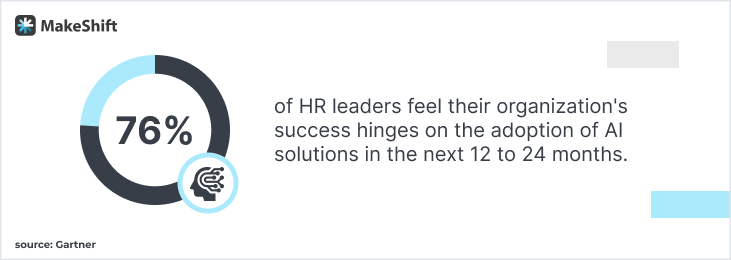
Have you dipped your toe into the shallow end of the AI pool? If not, now it’s time to dive into the deep end.
Here's a snapshot of how AI is currently being used in HR:
1. Resume Screening & Applicant Tracking — AI-powered tools quickly sift through resumes and match the best candidates to job openings, saving HR teams valuable time.
2. Employee Engagement & Performance Management — AI helps measure and enhance employee engagement and performance by analyzing data and providing insights into potential areas of improvement.
3. Talent Acquisition & Retention — AI-driven predictive analytics offer valuable insights into identifying top talent and retaining key employees.
4. Staff Scheduling, Smart Support, Workforce Forecasting — AI offers suggestions to optimize staff schedules, provides intelligent support for HR tasks, and forecasts accurate workforce needs in seconds.
3 Reasons HR Leaders Are Excited About Using AI in HR Today
You may be concerned that AI will impact the human touch aspect of HR. Remember, AI can’t replace people. It’s simply a tool — a tool that can enhance efficiency and employee experience within your company.
So, let’s look at 3 benefits of using this tool in HR.
Reason #1: Efficiency & Time Savings
85% of employers using automation or AI say it saves time and boosts efficiency.
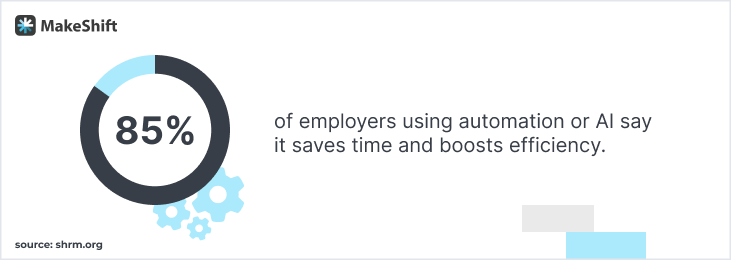
AI automates routine, time-consuming HR tasks like resume screening, staff scheduling, and data analysis. This automation lets you focus on more strategic and value-added activities, saving time and boosting overall departmental efficiency.
Reason #2: Better Decision-Making
According to an Eightfold report about the future of work, 86% of HR professionals prefer using automated systems to assist decision-making.
AI can provide data-driven insights and predictive analytics to help you make more informed decisions. This includes:
- Identifying top talent
- Addressing attrition risks
- Optimizing workforce planning
Reason #3: Enhanced Employee Experience
According to Oracle and Future Workplace's research, 64% of employees trust robots more than their managers. This bodes well for you if you use chatbots to handle employee requests.
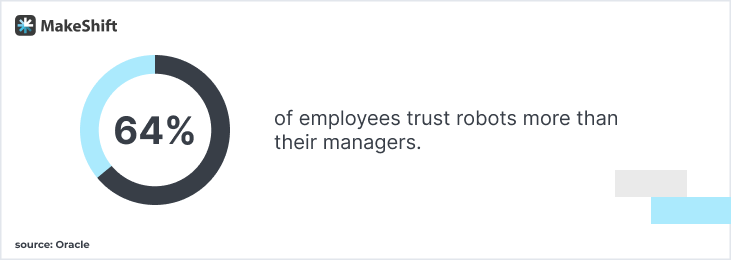
AI-powered tools, like chatbots and virtual HR assistants, offer quick, personalized support to your employees. This elevates their experience by providing 24/7 assistance and answers.
7 Cutting-Edge Trends and Use Cases for AI in HR You Can't Afford to Miss
AI-powered tools update and streamline old-school HR practices because they allow for more intuitive processes throughout the lifecycle of your employees.
Check out these 7 trends and use cases for AI in HR.
1. Revolutionizing Recruiting
Home appliance manufacturer Electrolux Group was struggling with a talent shortage, so they implemented an AI-powered platform to overhaul most of their recruiting process.
The new platform’s AI-driven fit scoring, candidate matching, and one-way interviews helped recruiters and hiring managers improve the screening and selection process for better fits in less time.
Harnessing AI resulted in:
- 84% increase in application conversation rate
- 9% decrease in time to hire
- 20% recruitment time saved using one-way interviews
- 78% time saved through AI appointment scheduling
AI is a game-changer for recruiting and talent acquisition — it’s transforming traditional HR practices. Here are 5 use cases that you should pay attention to:
1. AI-Driven Diversity and Inclusion — AI is pivotal in fostering diversity and inclusion, helping your organization identify and mend any gaps.
2. Fair and Unbiased Recruitment — AI ensures a level playing field by promoting fair and unbiased recruitment practices, guaranteeing everyone a fair shot.
3. Resume Screening Reinvented — Say goodbye to tedious resume sifting. AI algorithms do the heavy lifting, swiftly identifying top candidates.
4. Chatbots Create Connection — AI-powered chatbots kickstart the conversation with applicants, fielding initial queries and guiding them through the application process.
5. Predictive Wizardry — AI's predictive analytics unleash the magic, providing recruiters with insights to foresee candidate success, enabling smarter decisions.
2. Onboarding that Saves HR Staff’s Time
Thanks to AI, your employee onboarding can get a much-needed upgrade. With AI tools, you’ll ensure your new hires receive comprehensive onboarding without draining the HR staff’s time.
According to Leena AI’s “State of Employee Onboarding Report 2022”, 68% of companies have started using AI to automate onboarding processes.
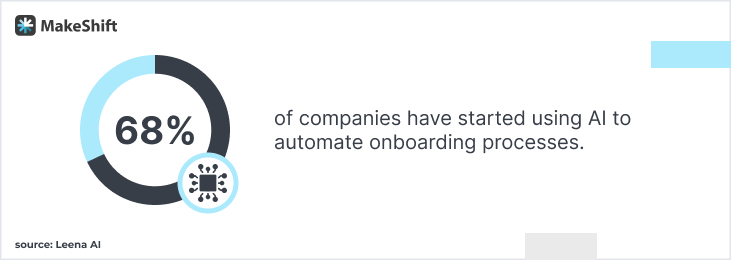
You can implement AI in your onboarding process through:
- An automated onboarding process — AI can automate the onboarding process by guiding new employees through paperwork, training schedules, and company policies.
- Virtual reality (VR) simulations — VR combined with AI can create immersive onboarding experiences, allowing new employees to familiarize themselves with the workplace environment.
3. Employee Well-Being Prioritization
You already know that human capital drives your company's success and that prioritizing employee well-being supports the longevity of your organization.
You’re not alone.
Over 75% of high-performing companies surveyed for an SHRM report said they regularly measure employee health status as a component of their overall employee management strategy.
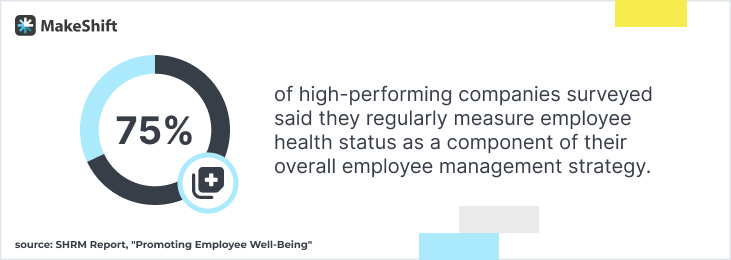
AI-powered platforms can support employee well-being with:
- Intuitive staff scheduling — AI-powered scheduling software allows your staff to have more of a say in their work schedules through options like self-scheduling and employee availability. This promotes work-life balance and boosts employees' overall well-being.
- Mental health support — AI-powered chatbots or virtual therapists can provide on-the-spot support to employees experiencing stress or mental health issues.
- Health & wellness programs — AI can analyze health data to tailor wellness programs, offering personalized recommendations to your employees for maintaining a healthy lifestyle.
4. People-First Workforce Management & Staff Scheduling
Workforce management and scheduling staff are 2 of the most time-consuming tasks in HR. And yet, if not done properly, these tasks can sink your ship faster than the Titanic.
Let’s address how to use AI to handle workforce management first.
Chatbots for HR queries — AI-powered chatbots can handle routine HR queries from employees, providing quick and accurate responses 24/7.
Then, with AI and staff scheduling…
Scheduling software that offers automated scheduling can revolutionize the manual process that’s notoriously dominated by spreadsheets. AI algorithms can optimize shift planning and skills-based scheduling, considering employee availability and workload.
Use an AI-powered scheduling platform as a guide in creating staff schedules. AI can filter through past schedules, time-off requests, and employee preferences in a flash and make suggestions.
5. Employee Engagement and Retention
Skincare company Kiehl's Since 1851, chose to build a global learning platform with personalization at the program's core. The platform lets learners receive customized training content that automatically adjusts on the fly to align with individual employee needs.
They’ve got 300+ digital education courses available in 11 languages and accessible in over 45 countries.
As Kiehl's business grows, so do its employees, all with the support of AI.
We’re all trying to boost engagement and retention — why not harness the power of AI to help you hang on to top talent?
You can do this in several ways:
- Personalized learning and development recommendations — AI can recommend personalized training programs based on employees' skills, preferences, and performance data, enhancing their professional development and offering upskilling opportunities.
- Sentiment Analysis — AI algorithms can analyze employee feedback from surveys, emails, or social media to gauge overall sentiment and identify areas of concern.
6. Real-Time Employee Performance Management
AI allows you to efficiently and effectively evaluate employees’ performance in a fraction of the time it takes to do this manually. When you use AI, you’ll get:
- 360-degree feedback — AI facilitates collecting and analyzing feedback from multiple sources to provide a comprehensive view of employee performance.
- Real-time performance monitoring — AI tools can provide real-time feedback and suggestions to employees and managers based on their performance data.
7. Automated Compliance and Risk Management
Keeping up with mountains of data and regulations becomes a risky juggling act if you don’t have a system that automatically ensures compliance.
The risk is simply not worth it. A study from Globalscape found that the cost to be out-of-compliance is 2.71X more than the cost to maintain compliance.
One of HR’s key roles is monitoring compliance and risk. AI can monitor compliance for you in less time and more accurately.
AI can help you stay updated with changing labor laws and regulations, ensuring your company policies and practices remain compliant.
Ethical Considerations of AI in HR to Carefully Manage
AI is a leap for humankind, but it’s not perfect. Implementing AI responsibly and ethically, ensuring fairness, and avoiding bias in HR decisions are vital to using AI technology. There are 3 ethical areas to consider:
Bias and fairness in AI-based decision-making
Implement measures to identify and mitigate biases in AI algorithms used for recruitment, performance evaluations, staff scheduling, and promotion decisions.
Conduct regular audits to double-check for fairness.
Privacy concerns in employee data management
Only collect and store necessary employee data required for HR processes to reduce the risk of privacy violations. Also, implement robust data security measures to safeguard employee info and ensure compliance with data protection regulations, like GDPR.
Transparency and accountability in AI systems
Strive for transparency in AI decision-making by using explainable models, allowing HR professionals to understand how AI arrives at its conclusions.
It’s a good idea to keep comprehensive records of any AI-driven decisions. This provides employees with clear explanations and an avenue for reporting concerns or disputes related to AI-generated outcomes.
How to Prep for the AI-Driven HR Future
The future of HR is promising to be driven by AI. Overall, it’s a good thing. AI can allow you to do more with less while finding top talent and elevating the employee experience.
Here’s how to get ready for the future of AI in HR.
Adapt and embrace AI technologies
Embrace AI by learning, testing, and talking to other HR thought leaders in these 3 ways.
1. Education & Training — Invest in learning and training programs to become familiar with AI tech and grow your AI-related skills and knowledge.
- Attend workshops & seminars
- Take online courses
- Attend conferences like SuccessConnect
2. Pilot Projects — Initiate small-scale AI projects to gain practical experience in using AI. You’ll be able to see the direct impact and build confidence in AI adoption.
Your first small pilot project could be trying AI-powered resume screening.
3. Collaboration & Networking — Engage with AI experts, industry peers, and tech partners to stay updated on AI trends and best practices. Build a network and share experiences to facilitate a smoother transition into AI-enabled HR practices.
Upskill and reskill your HR team
Evaluate your HR team to see where their AI skills are and find out what training or mentoring needs to happen.
- Find skill gaps — Conduct a skills assessment to identify which AI-related skills are lacking within your HR team.
- Start training — Implement training programs, both internal and external, to upskill your HR team in AI technologies and data analysis.
- Mentor & share knowledge — Encourage knowledge sharing within your team. Foster mentorship relationships where more AI-savvy team members help others adapt to AI tools and concepts.
HR and IT collaboration to implement AI solutions
When implementing AI tech, your HR and IT departments must work together. Use this small checklist as a guide to enhance collaboration.
- Clear communication — Ensure effective communication between your HR and IT departments to accurately define AI requirements and objectives.
- Cross-training — Encourage cross-training between HR and IT staff to bridge the gap in technical understanding and HR domain knowledge.
- Collaborative project teams — Form interdisciplinary teams that consist of HR and IT professionals to work together on AI implementation projects to ensure you use everyone’s diverse expertise effectively.
How MakeShift Supports HR Through AI-Powered Platform For Staff Scheduling
Using AI for staff scheduling gives you an automated solution to filter through all employee information for you — info like when they can work and what they're good at.
AI solves many of the problems associated with staff scheduling, leaving you with a more streamlined workflow that helps avoid overworking your employees.
AI can process employee availability and past schedules in a flash and offer suggestions to help you create more accurate schedules in a fraction of the time.
✶Bonus✶ — Employees appreciate having more say in their schedules.
We’d like to introduce ShiftMate AI, our AI-powered scheduling platform that takes smarter scheduling to the next level.
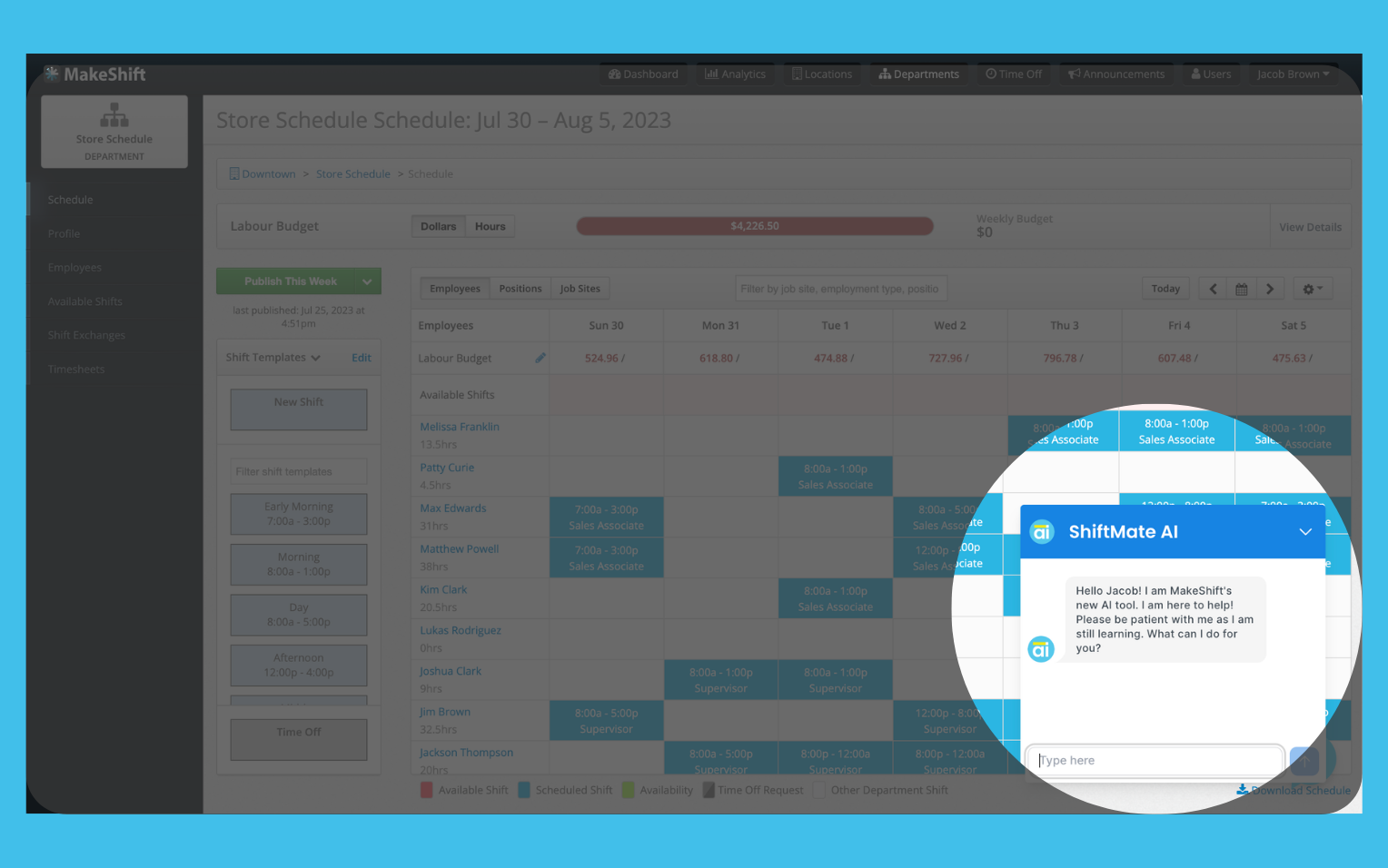
SmartSupport - Provides AI-powered 24/7 support ready to provide scheduling help on-demand. You’ll get:
- Real-time responses to your questions
- Step-by-step instructions
- Scheduling tips
- It's the support you need WHEN you need it.
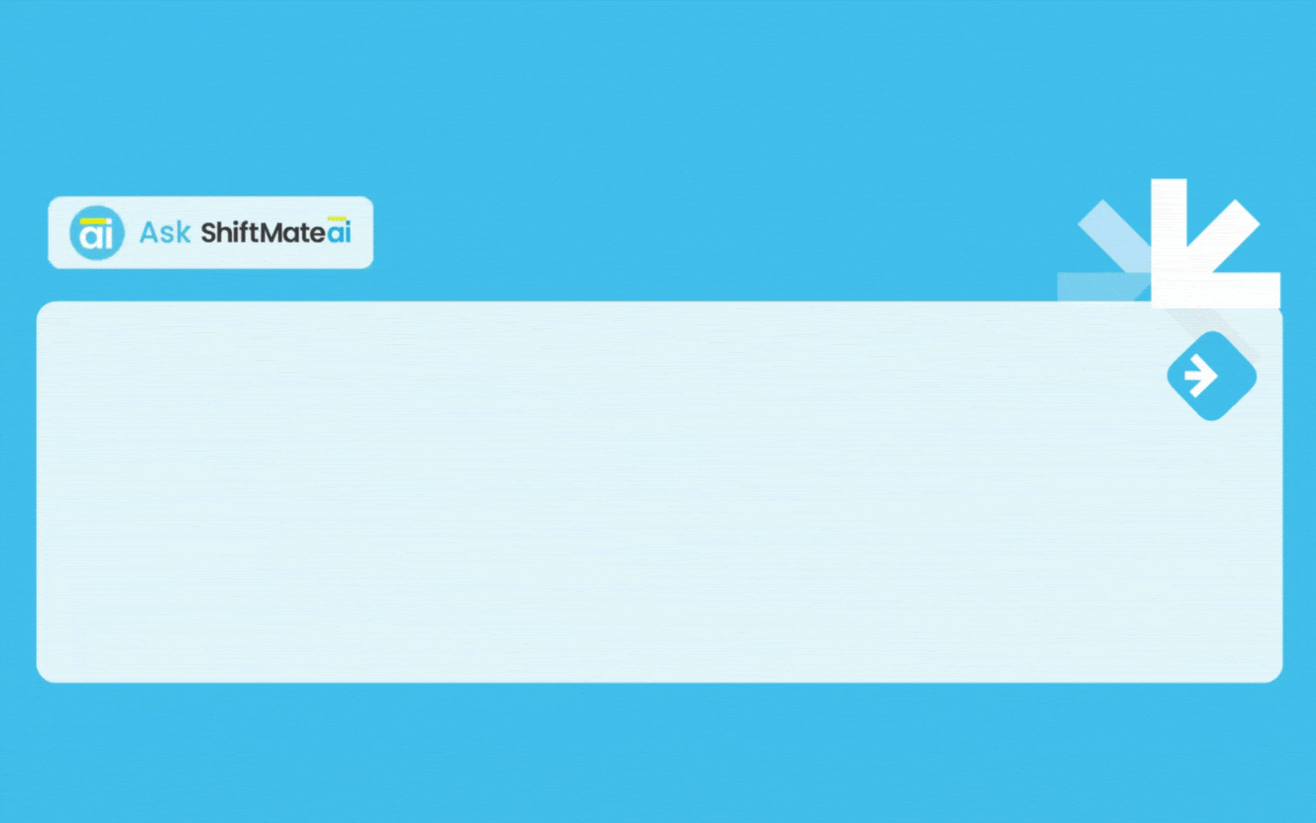
ShiftPredict powered by Ikigai Labs analyzes historical data and identifies patterns in key performance indicators like:
- Patient volume in healthcare
- Retail customer footfall
- Hospitality occupancy rates
ShiftPredict helps you plan future schedules with the optimal number of staff, enhancing efficiency and employee satisfaction.
AI Can Enhance HR — If You Let It
In today’s world of HR, the rapid integration of AI is reshaping traditional practices and propelling organizations towards unprecedented efficiency and employee-centric experiences.
From revolutionizing recruitment and onboarding to enhancing employee well-being and workforce management, the current state of AI in HR is marked by streamlined processes and data-driven decision-making.
Smarter, more streamlined processes centered around people are what we’re about at MakeShift. Ready to see what AI-powered scheduling can do for you? Book a free demo today.




